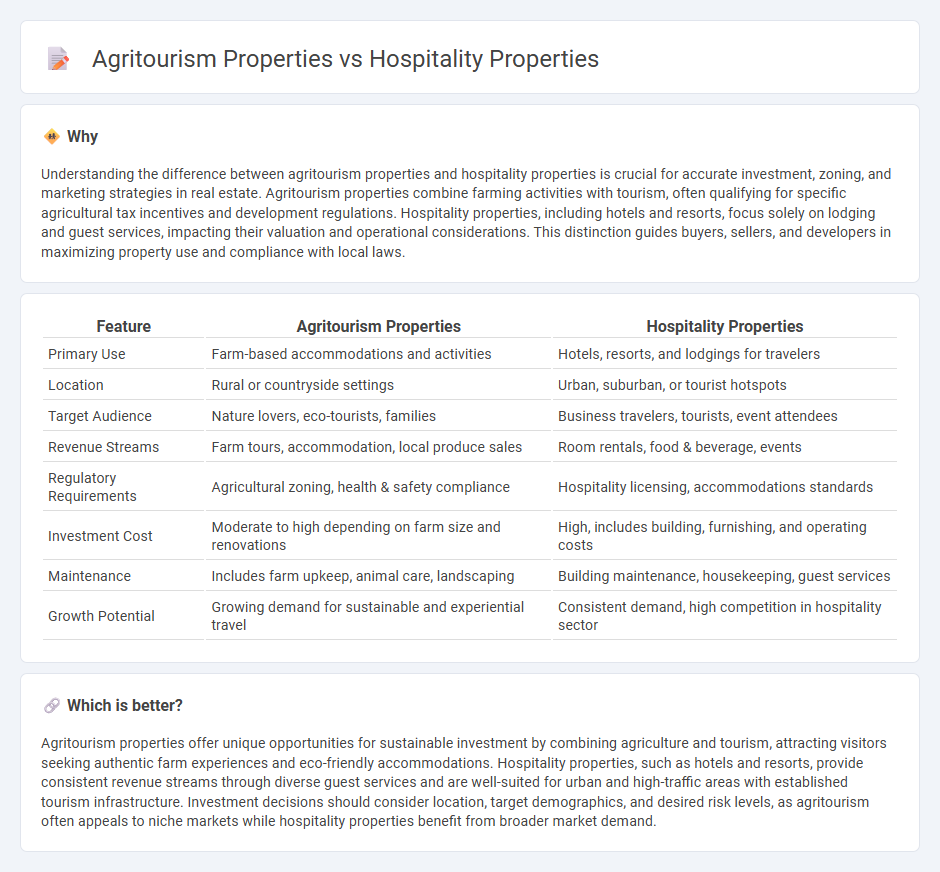
Agritourism properties offer unique opportunities by combining agricultural activities with lodging, attracting visitors interested in farm experiences and rural lifestyle. Hospitality properties focus primarily on providing accommodation and services in diverse settings, prioritizing guest comfort and convenience. Explore the distinct benefits and considerations of agritourism versus hospitality properties to determine the best investment for your real estate portfolio.
Why it is important
Understanding the difference between agritourism properties and hospitality properties is crucial for accurate investment, zoning, and marketing strategies in real estate. Agritourism properties combine farming activities with tourism, often qualifying for specific agricultural tax incentives and development regulations. Hospitality properties, including hotels and resorts, focus solely on lodging and guest services, impacting their valuation and operational considerations. This distinction guides buyers, sellers, and developers in maximizing property use and compliance with local laws.
Comparison Table
| Feature | Agritourism Properties | Hospitality Properties |
|---|---|---|
| Primary Use | Farm-based accommodations and activities | Hotels, resorts, and lodgings for travelers |
| Location | Rural or countryside settings | Urban, suburban, or tourist hotspots |
| Target Audience | Nature lovers, eco-tourists, families | Business travelers, tourists, event attendees |
| Revenue Streams | Farm tours, accommodation, local produce sales | Room rentals, food & beverage, events |
| Regulatory Requirements | Agricultural zoning, health & safety compliance | Hospitality licensing, accommodations standards |
| Investment Cost | Moderate to high depending on farm size and renovations | High, includes building, furnishing, and operating costs |
| Maintenance | Includes farm upkeep, animal care, landscaping | Building maintenance, housekeeping, guest services |
| Growth Potential | Growing demand for sustainable and experiential travel | Consistent demand, high competition in hospitality sector |
Which is better?
Agritourism properties offer unique opportunities for sustainable investment by combining agriculture and tourism, attracting visitors seeking authentic farm experiences and eco-friendly accommodations. Hospitality properties, such as hotels and resorts, provide consistent revenue streams through diverse guest services and are well-suited for urban and high-traffic areas with established tourism infrastructure. Investment decisions should consider location, target demographics, and desired risk levels, as agritourism often appeals to niche markets while hospitality properties benefit from broader market demand.
Connection
Agritourism properties leverage agricultural land and resources to offer unique lodging and experiential opportunities, seamlessly integrating hospitality services with rural settings. Hospitality properties on agritourism sites attract visitors seeking authentic farm-to-table experiences, outdoor activities, and cultural immersion, enhancing revenue streams for landowners. The synergy between agritourism and hospitality amplifies regional economic development by promoting sustainable tourism and preserving local heritage.
Key Terms
Zoning regulations
Zoning regulations for hospitality properties typically allow for commercial use with provisions for restaurants, accommodations, and event spaces, ensuring adherence to safety and health codes in urban or tourist-centric areas. Agritourism properties are subject to agricultural zoning laws, which may restrict commercial activities but permit farm-based tourism such as pick-your-own produce, farm stays, and educational tours under specific agritourism ordinances. Explore our detailed guide to understand how zoning impacts your investment or development in hospitality and agritourism sectors.
Revenue streams
Hospitality properties generate revenue primarily through room rentals, food and beverage services, event hosting, and ancillary amenities like spas and recreational activities. Agritourism properties diversify income by combining lodging with farm-based experiences, such as tours, farm-to-table dining, workshops, and direct sales of agricultural products. Explore further to understand how these distinct revenue models impact profitability and guest engagement.
Guest experience
Hospitality properties emphasize personalized services, luxurious amenities, and seamless technology integration to elevate guest satisfaction, while agritourism properties focus on immersive rural experiences, local culture, and sustainable practices that connect guests to nature and farming life. The guest experience in hospitality settings often centers around comfort, convenience, and entertainment, whereas agritourism prioritizes authenticity, education, and hands-on activities such as farm tours and farm-to-table dining. Explore in-depth comparisons of guest experience strategies in hospitality and agritourism to optimize your property's appeal.
Source and External Links
Understanding Hospitality Real Estate - A Complete Guide - Hospitality properties include hotels, motels, resorts, restaurants, bars, spas, travel centers, conference centers, music venues, and wedding venues, all focused on providing amenities for people away from home and generating consistent cash flow.
Hospitality Properties Trust (HPT) - Hospitality Properties Trust is a REIT that owns and leases 274 hotels with 37,132 rooms, focusing on high-quality hotels leased to experienced operators to generate rental income above capital costs.
Hospitality Properties For Sale - The hospitality real estate market includes a billion-dollar industry of diverse properties such as luxury hotels, resorts, golf courses, and marinas, with specialized investment advisory and transaction services available to maximize returns.
 dowidth.com
dowidth.com